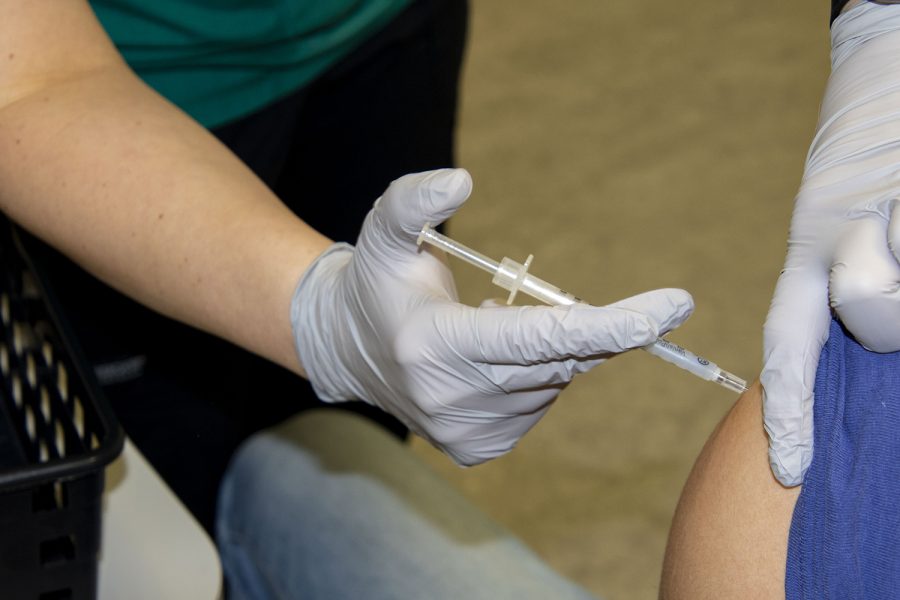COVID-19, flu vaccines safe to take together
With flu season approaching and further approval of the Pfizer COVID-19 vaccine by the Food and Drug Administration, medical professionals say it is safe to get flu and COVID-19 vaccinations together.
U of Iowa students given first round of vaccinations on Thursday, Jan 28, 2021. A medical student receives the Moderna vaccine.
October 27, 2021
Medical experts say people can get their COVID-19 and flu vaccination at the same time, as the flu season and winter approaches.
Mike Brownlee, chief pharmacy officer at the University of Iowa Hospitals and Clinics, said getting both the flu and COVID-19 vaccines at the same time is not only safe, but also encouraged.
“Sometimes it’s more convenient to do them all at once. We don’t want people to forget and get one and not the other,” Brownlee said. “It’s so important this year to get both the flu and COVID-19 vaccine or booster.”
When it comes to side effects from either vaccine, Brownlee said there is no definitive indication of increased side effects from getting both vaccines at the same time, which the Center for Disease Control and Prevention noted.
Christine Petersen, UI professor of epidemiology and director of the Center of Emerging Infectious Diseases, said the most common side effects for both vaccines are inflammation and soreness at the injection site. Another common side effect, she said, is a swollen lymph node in the armpit.
“Those are literally the cells that are taking the instructions from the vaccine and putting them to work,” Petersen said. “… The army is being built.”
Petersen said getting both vaccines is about protecting the people who can’t get the shot because of allergies, weakened immune systems, or other complications.
While it is unknown at this point whether the effects of the vaccines work in tandem, Brownlee said, the flu vaccine is known to ramp up the immune system when administered.
He said people should only be wary of getting vaccinated against COVID-19 if they are allergic to ingredients in the vaccine or if they have had an adverse reaction to a previous dose.
RELATED: UI Health Care employees tiring out from marathon pandemic
“We always encourage people to talk to their providers too, because there may be situations where we can get an individual their second dose under supervision,” he said.
Petersen added that people going through certain types of chemotherapy could also be more prone to adverse reactions to the COVID-19 vaccine.
Brownlee said there is sufficient data for the COVID-19 vaccine that should put people who are hesitant about the vaccine at ease.
“We’ve now given these vaccines to hundreds of millions of people,” he said, “It’s proven to be safe. It’s proven to be effective … Many of the people you work with every day have all been vaccinated and you can see that there’s no harm to them by receiving the vaccine.”
Brownlee said we have more data on the COVID-19 vaccine than many vaccines that have been approved for years, such as the shingles vaccine.
Petersen said 90 percent of the people being hospitalized due to COVID-19 are people who have not yet been vaccinated.
“The way we made the [COVID-19] vaccine was so that it would prevent the severe disease,” Petersen said.
Sam Jarvis, community health division manager for Johnson County, said while flu transmission has been low, COVID-19 transmission levels are still high in Johnson County, along with the rest of Iowa.
He said the number of new COVID-19 cases has been slowly dropping in recent weeks, but there are still concerns.
“Certainly, the outstanding question for a lot of us though, is if we’ll see another surge or wave like we did last year around this time,” he said.



